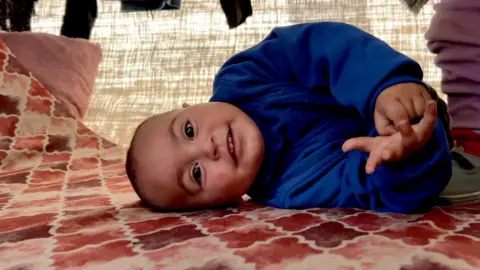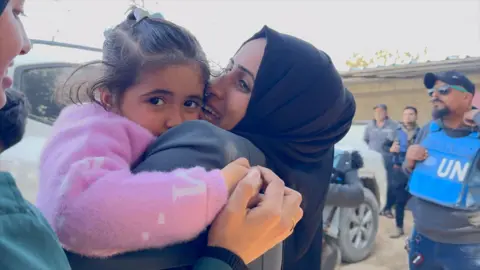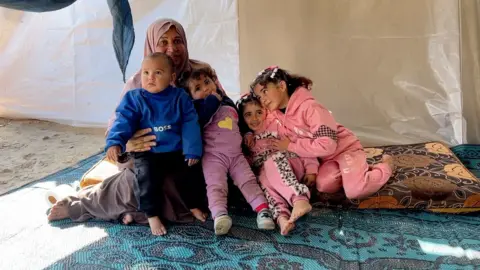
 BBC
BBCThey are smiling now as they play together in the sand in the Al-Mawasi camp in the southern Gaza Strip, but the children of the Al-Masry family survived horrific events.
Their grandmother, Kawthar Al-Masry, says: “Their lives were in danger, and they were exposed to a lot of killing and destruction.”
Six weeks ago, an Israeli bombing hit their home in the northern town of Beit Lahia, killing one-year-old Jamal's parents, mother, and his two younger cousins, Maria, Janna, and Zeina, aged between two and nine. Israeli forces arrested the girls' father more than a year ago.
When the children were pulled from under the rubble, they were injured and alone.
Since the beginning of the war in Gaza, more than 14,500 children have been killed, thousands more injured, and an estimated 17,000 children have been left unaccompanied or separated from the family members who would normally care for them.
Some are too young to know their names and remain anonymous.
In chaos amid bombings and mass displacement, the United Nations Children's Fund, UNICEF, was able to reunite only 63 children with their parents or guardians. Last month, the BBC followed the story of Al-Masry's four cousins.
Kawthar Al-Masry told us: “The joy of their return is indescribable, but it is overshadowed by sadness. They returned without their parents.”

Initially, the news that reached Kawthar in mid-November was that all her loved ones who remained in the family home in northern Gaza had been killed. But she says that after she prayed, she received news that three of her grandchildren were still alive.
She knew immediately that she had to bring it to her. “I missed them,” she explains. “Honestly, I wish I could go to the north and get them, but God’s will is above all else.”
For more than a year, Israel has divided the northern third of the Gaza Strip from the southern two-thirds along the Gaza Valley line. Humanitarian workers must carry out special coordination to cross the Israeli military zone that divides the area.
After Kawthar gathered the documents she needed, UNICEF conducted her own welfare checks and went through the arduous process of arranging the transportation of Al-Masry's children.
While the four bereaved cousins were undergoing medical treatment, their distant relatives were taking care of them. UNICEF filmed their emotional farewell before taking the children away in armored vehicles.
The short distance from Gaza City to Deir al-Balah, where the convoy was now headed, involved crossing an Israeli checkpoint, was time-consuming driving and could be extremely risky as the war raged on. However, UNICEF says it is prioritizing the reunification of children.
“The challenges are multiple,” says Rosalia Poulin, UNICEF spokeswoman. “But we are talking about very vulnerable children here.”
“These are stories of loss – deep psychological trauma and physical trauma, and for these children to recover. The fact that they are reunited with one or both parents, or a family member, is extremely important.”

Kawthar describes the agonizing wait on the day the children were due to arrive until UNICEF finally contacted them. She didn't see her grandchildren for 14 months.
“I didn't know who to hug first!” I shouted. “The first person I hugged was Jana, then Zeina. I kissed her and hugged her.”
“My son’s kids called me ‘Coco,’ and even though Zeina couldn’t speak the last time I saw her, she knew that was my nickname. She kept asking, ‘Are you Coco?’” 'Are you the one I came here for?' 'And I told her I felt safe.'
The story of the Masri family is not uncommon. They were divided in the early days of the war.
A week after a Hamas attack on October 7, 2023 that killed about 1,200 people in southern Israel, the Israeli military ordered 1.1 million people in northern Gaza to move south, signaling that it was planning to launch a ground invasion.
Kawthar and most of her children quickly packed their belongings and moved to Rafah, but transportation for her two sons, Ramadan and Hamza, was disrupted. They ended up staying with their wives – one of whom was pregnant – and their young children.
In November 2023, Israeli forces arrested Hamza in Beit Lahia. His close relatives insist that he is farmers and has no political affiliations. The BBC was unable to obtain information from the Israeli authorities about what happened to Hamza.
Israel arrested thousands of Gazans during the war, saying they were suspected of terrorism.
“This was our destiny,” Kawthar tells us desperately. “We lost our homes, our land, our loved ones, and were divided between north and south.”
With so many people missing, many are turning to the International Committee of the Red Cross for help. He takes detailed information and cross-references it with sources he has access to, such as hospital lists and names of returned detainees.
More than 8,300 cases have been reported to the organization but only about 2,100 have been closed. Of these cases, only a few led to family reunification.
“People are in limbo,” says Sarah Davies of the ICRC. “They don’t know whether their family members are alive, whether they are injured or in hospital, whether they are trapped under rubble, or whether they will see them again.” “.
Doctors and hospital staff also play a role in trying to connect their patients with their loved ones.
Almost a year ago, the British Broadcasting Corporation (BBC) filmed a newborn baby girl who was born by Caesarean section after her mother was killed in an Israeli air strike. The paramedics named the child “Hanna Abu Amsha’s daughter” and kept information about her in the hope that her relatives would be able to find her.
Recently, the nursery at Shuhada al-Aqsa Hospital in Deir al-Balah reported that the girl was finally handed over to her father and is in good health.
Days after the Al-Masry family reunion, a local journalist working with the BBC visited Kawthar and her grandchildren in the Al-Mawasi camp for displaced people, where they now live in a tent. With aid in short supply, UNICEF helped them obtain additional food and medicines.
The girls were also wearing warm jackets — some protection from the cold temperatures that have led to several children dying from hypothermia, including in the camp on the coast, near the city of Khan Yunis.
While Kawthar feels comfortable having the children with her, she still does not feel that they are safe. She worries about how to take care of them and their mental health.
“They are in shock,” she says. “No matter how much we try to distract the girls and avoid talking about the war, every now and then they wander into their thoughts.”
“When night comes, they feel afraid. They say: There is a plane, there is a strike. They ask me: Has dawn come yet? And only when morning comes, they begin to feel reassured.”
Kawthar says she very much hopes for a ceasefire and for her grandchildren to be able to rebuild their lives. So that we do not become part of a lost generation.








